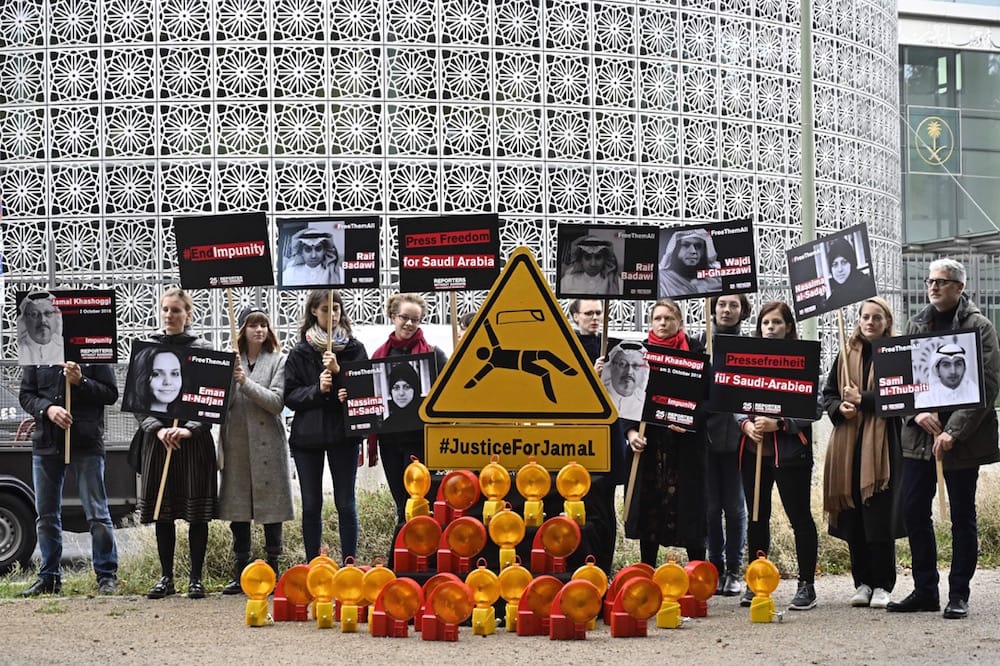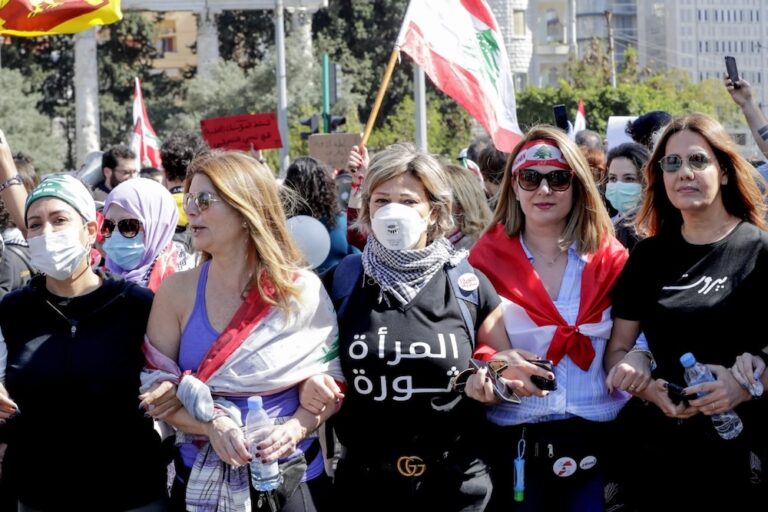The complaint details a litany of crimes against humanity committed against 35 journalists in Saudi Arabia, including that of murdered Saudi columnist Jamal Khashoggi.
This statement was originally published on rsf.org on 1 March 2021.
Reporters without Borders (RSF) has filed a criminal complaint with the German Public Prosecutor General targeting Saudi Crown Prince Mohammed Bin Salman and other high-ranking Saudi officials responsible for crimes against humanity. The complaint reveals the widespread and systematic nature of the persecution of journalists in Saudi Arabia, in particular the arbitrary detention of 34 journalists and the assassination of Jamal Khashoggi.
On 1 March 2021, RSF filed a criminal complaint with the German Public Prosecutor General of the Federal Court of Justice in Karlsruhe, detailing a litany of crimes against humanity committed against journalists in Saudi Arabia. The complaint, a document of over 500 pages in German, addresses 35 cases of journalists: slain Saudi columnist Jamal Khashoggi, and 34 journalists who have been jailed in Saudi Arabia, including 33 currently in detention – among them, blogger Raif Badawi.
A crime against humanity is a widespread and systematic attack committed by individuals in full knowledge of this attack against a civilian population. In Saudi Arabia, journalists, who are a civilian population according to international law, are victims of widespread and systematic attacks for political reasons in furtherance of a state policy aimed at punishing or silencing them. The five suspects identified in the complaint are fully responsible.
Pursuant to the German Code of Crimes against International law (VStGB), the complaint shows that these journalists are the victims of multiple counts of crimes against humanity, including willful killing, torture, sexual violence and coercion, enforced disappearance, unlawful deprivation of physical liberty, and persecution.
The 35 cases detailed in the complaint reveal a system that threatens the life and liberty of any journalist in Saudi Arabia – in particular those who speak out publicly against the Saudi government. For RSF, the essential role of journalists to inform the public on issues of general interest, to monitor the actions of the authorities, and to hold them accountable makes crimes against them all the more grave and warranting investigation.
The complaint identifies five primary suspects: Crown Prince of Saudi Arabia Mohammed Bin Salman, his close advisor Saud Al-Qahtani, and three other high-ranking Saudi officials for their organisational or executive responsibility in Khashoggi’s killing, as well as their involvement in developing a state policy to attack and silence journalists. These primary suspects are named without prejudice to any other individual the investigation might identify as responsible for these crimes against humanity.
On 26 February, the Office of the Director of National Intelligence (ODNI) published a declassified Central Intelligence Agency (CIA) report that reiterates previous inculpatory elements and further confirms RSF’s own assessment that such crimes against humanity targeting such people as journalists, have been decided by the Crown Prince as part of a systematic policy.
“Those responsible for the persecution of journalists in Saudi Arabia, including the murder of Jamal Khashoggi, must be held accountable for their crimes,” declared RSF Secretary-General, Christophe Deloire. “While these serious crimes against journalists continue unabated, we call on the German prosecutor to take a stand and open an investigation into the crimes we have revealed. No one should be above international law, especially when crimes against humanity are at stake. The urgent need for justice is long overdue.”
“The official opening of a criminal investigation in Germany into the crimes against humanity in Saudi Arabia would be a world first,” said RSF Germany Director Christian Mihr. “We ask the Public Prosecutor General to open a situation analysis, with a view to formally launching a prosecutorial investigation and issuing arrest warrants.”
RSF determined that the German judiciary is the best suited system to receive such a complaint, as German laws give them jurisdiction over core international crimes committed abroad, and German courts have already shown readiness and willingness to prosecute international criminals. Moreover, the German government has repeatedly expressed its great interest in achieving justice in the cases of Jamal Khashoggi and Raif Badawi, and Germany has demonstrated commitment to the defence of press freedom and the protection of journalists around the world.
Jamal Khashoggi was murdered in the Saudi consulate in Istanbul in October 2018. The Saudi authorities officially recognised that the murder was committed by Saudi agents, but refused to take any responsibilty for what they called a “rogue operation.” Some of the agents who took part in the operation were prosecuted and sentenced in Saudi Arabia during a secret trial which violated all international fair trial standards. The main suspects remain fully immune to justice.
Besides Saudi Crown Prince Mohammed Bin Salman, who is suspected to have directly ordered the assassination of Khashoggi and who is primarily responsible for the persecution of journalists in Saudi Arabia, the four other suspects listed in the complaint are Saud Al-Qahtani, a close adviser to the Crown Prince who took direct part in the planning and execution of the murder as well as in the implementation of the policy of persecution of journalists in Saudi Arabia; Ahmad Mohammed Asiri, (former) deputy head of intelligence, who is suspected of supervising the murder; Mohammad Al-Otaibi, the Consul General in Istanbul at the time of the murder; and Maher Abdulaziz Mutreb, an intelligence officer who led the team that tortured, killed and forcibly disappeared Jamal Khashoggi.
This complaint was prepared under the framework of RSF’s Justice for Journalists Task Force (J4JTF), a special initiative to confront the impunity challenge for crimes against journalists through strategic litigation.
Over the past two years following Khashoggi’s assassination, RSF has engaged in extensive advocacy with the Saudi authorities, seeking to recover his body, to obtain justice for his murder, and to release all journalists currently arbitrarily detained in Saudi Arabia. The Saudi authorities have, however, persistently failed to implement their international obligations.
Saudi Arabia is ranked 170th out of 180 countries in RSF’s World Press Freedom Index.



